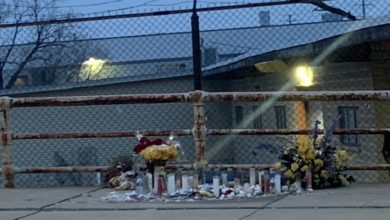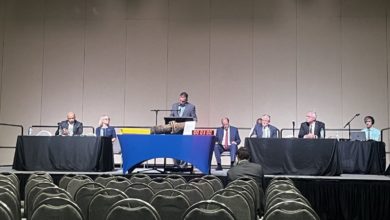Just nine miles away from Lake Michigan, one of the largest sources of freshwater on earth, a community has gone almost a week without safe drinking water.
Residents of Dixmoor, a suburb south of Chicago, have been without water for six days as of Oct. 22. Large sections of this community have no running water at all due to water pressure issues, and a boil-water order remains in effect for all of the village.
Local schools have canceled class and county officials are scrambling to distribute bottled water and open facilities for residents to shower.
Dixmoor is a working class, predominantly Black and Latino suburb of less than 3,000 residents. Though relatively small by itself, it is part of a sprawling collection of communities south of the official Chicago city limits that are largely working-class communities of color.
Dixmoor Mayor Fitzgerald Roberts said that he hoped the crisis would be resolved over the weekend. Dixmoor released a statement saying they believe a faulty valve underground in neighboring Harvey is causing the issue. Even if this theory is correct, the village still faces big issues with their water supply.
Mayor Roberts told Liberation News that federal support is needed to repair the water infrastructure in the community. “Yes, we need more money spent on infrastructure here. Our pipes over here are probably about 120, 130 years old, so yes, they broke down.”
Local residents have volunteered to distribute bottled water at the village hall, providing some temporary relief to residents.
One volunteer was Joseph Banks, who is staying in a Dixmoor halfway house that has had its water cut off.
“I was released from prison not too long ago and trying to change my life a little bit and I think by giving back to community it’s a good start,” he said.
Darvette Kelly of neighboring Posen received phone alerts about the water in her home, and for the past few days she says it has smelled off. Posen and Dixmoor have connected water systems, but since she technically does not live in Dixmoor she feels ignored.
“It kind of reminds me of what’s going on in Flint,” she said.
Being cut off from safe running water is not a new issue in the suburbs south of Chicago. Municipalities are willing to shut off water to houses that are behind on bills, even during crises. Whole communities have also been cut off from clean water by the failure of physical infrastructure.
During the summer of 2020, Dolton officials claimed budget issues forced them to resume water shutoffs they suspended when the pandemic started.
In University Park, residents have been using bottled water for two years since mismanagement by the private company that runs the village’s water system caused major lead contamination of the water.
Funding police, Amazon came before funding infrastructure
South suburban officials bear part of the blame for this continued crisis. There is a history of prioritizing the funding of unaccountable police departments over infrastructure and social services. In recent years, officials in this struggling region have also given hundreds of millions of dollars to some of the most powerful corporations in the world.
According to WBEZ, Chicago’s National Public Radio news source and the Better Government Association, Amazon was given $108 million in public incentives for a warehouse in University Park. Amazon was given another $322 million in public incentives to build a warehouse in Markham, a suburb neighboring Dixmoor. The massive corporation is able to extract huge concessions from municipalities for the chance to exploit the residents.
The scale of the problem is bigger than any individual suburb or local elected official. The U.S. capitalist system prioritizes the profits of major corporations like Amazon over the needs of the workers who actually keep things running.
In Black and Latino communities especially, major infrastructure issues are ignored until a crisis erupts.
A national issue
The current fight in Congress over infrastructure and social spending could be the start of addressing failing drinking water systems. The infrastructure bill dedicates $55 billion to clean drinking water, which the Biden administration claims “represents the largest investment in clean drinking water in American history.” More is clearly needed, with the liberal Brookings Institute estimating that replacing lead pipes could, by itself, cost $47 billion.
Conservative Democrats like Joe Manchin and Kristen Sinema insist that infrastructure spending should not be connected with social spending and corporate tax hikes. The water crisis in Dixmoor and nearby communities shows how they are wrong. Here we are seeing residents struggle with infrastructure failures which impact all aspects of their lives, meanwhile the corporations there get massive tax breaks.
While it is encouraging to see Dixmoor residents volunteer to help their neighbors through this crisis, a real solution means action and spending at a national level.
Darvette said the money needs to be spent to fix these problems with the infrastructure in her community, “especially if it’s gonna affect our health and our children’s health down the line.”
Water is a human need, and all people should have access to clean water. It is horrendous that people in the United States, the richest country in the world, do not have reliable access to this essential human need.
Feature photo: Volunteers distribute bottled water in front of Dixmoor Village Hall on Oct. 22. Liberation photo






